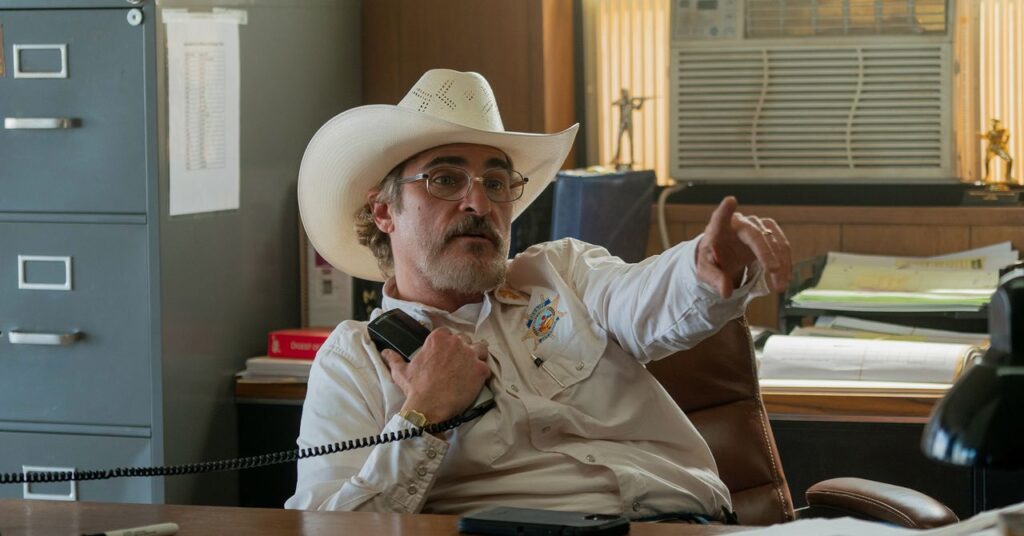Eddington also explores conspiracy theories and the podcasters and YouTubers who spread them online in exchange for influence and profit. Phoenix’s character will often return home to hear some disembodied voice spouting baseless claims through the speakers of an abandoned laptop. Later, his wife (Emma Stone) or mother-in-law (Deirdre O’Connell) will regurgitate those fringe theories over breakfast.
Again, Aster built this dark corner of his world out of real-life source material.
“One thing was inspired by somebody I heard on the street in New York with a microphone,” he says. “I wrote that down for later. Others were pulled from different corners of the internet.”
Aster’s overall goal with Eddington was to convey the overwhelming feeling of being online today, while still making a compelling movie.
“It was important to get as many voices in the cacophony and represent as many corners of the internet as possible—to make a coherent story about the incoherent miasma we are living in,” he says. “I wish we could have shown more, but we did as much as we could without it becoming distracting or no longer supporting the story.”
AI Is Creating An “Era of Total Distrust”
Eddington may primarily be a movie about how social media is breaking our brains, but there’s another technological innovation Aster was careful to represent in his movie: artificial intelligence. The film begins with a plan to build an AI-training data center on the edge of town, a plot point that resurfaces several times throughout the story (including in the election plotline, with Phoenix’s character campaigning against the shady business interests behind the new facility).
“It is mostly peripheral,” Aster says, “but for me, it’s the heart of the film. This is a movie about people living through Covid, navigating a crisis. Meanwhile, just outside of town, another crisis is being cooked up.”
In a recent interview with Letterboxd, the director opined that it’s “obviously already too late” to stop AI. But when pressed about the pros and cons of artificial intelligence, Aster describes it with a mix of wonder and fear.
“I’m in awe of what it can do, but I’m also very disturbed by it,” he tells me. “We’re living in an era of total distrust. This kind of imagery could lead to the end of video or audio evidence.”
As a director, he worries the ability to create transcendent art is being “flattened” by generative AI tools, while at the same time admitting that it’s opening up the film industry to more people than ever. “It’s been democratized in an exciting way,” he says. “There are more possibilities now, but something’s also going away.”
In his own very Ari Aster way, the twisted mind behind some of the most disturbing visuals of the 21st Century (from the unexpected decapitation that kicks off Hereditary to the literal penis monster in Beau Is Afraid) already misses the era of more uncanny AI imagery.
“In the beginning, when these systems were hallucinating and creating weird imagery — 12 fingers, bizarre stuff—that was more interesting to me,” he says. “The more polished it gets, the less exciting and more alarming it becomes.”
About That Ending …
Warning: Spoilers ahead for the end of Eddington.
Despite sometimes feeling like a Coen Brothers western on amphetamines, Eddington is impressively grounded throughout its nearly two-and-a-half-hour runtime—until the final act. After Phoenix’s character kills Pascal’s and then frames the local BLM protesters for the murder, a plane full of actual anti-fascist terrorists flies into town and starts blowing everything up.

